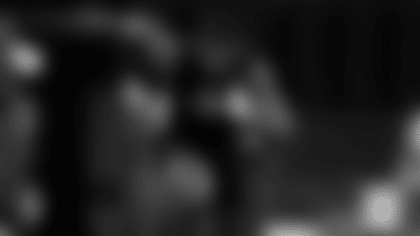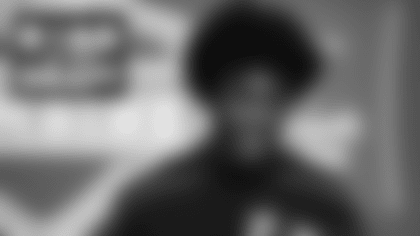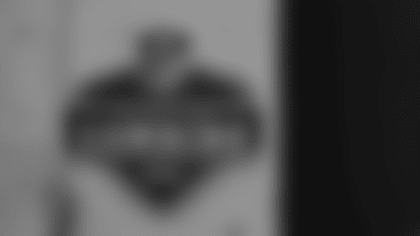All-Pro defensive back Nnamdi Asomugha retired as an Oakland Raider. He announced his retirement at a press conference held at the Raiders Alameda, Calif., facility.
Opening Statement by Raiders Owner Mark Davis:"Throughout our history, great cornerbacks have been a hallmark of the Raiders organization. I'm surrounded here today by some of the greatest cornerbacks, not only in Raiders history, but some of the greatest cornerbacks in the history of pro football. Willie Brown, Lester Hayes, Charles Woodson and all of us are here today to acknowledge another great cornerback, Nnamdi Asomugha, as he retires from the NFL as an Oakland Raider. Nnamdi is a prototype Raider cornerback who excelled in man-to-man coverage. He's a three-time Pro Bowler, was named first or second team All Pro four times in his career. In addition to distinguishing himself on the field, he was recognized as NFL Man of the Year in 2009 for his work in the community by his peers at the Player's Association. We were proud when we called his name in the first round of the 2003 Draft and we are proud to call him a Raider today and forever. I introduce to you, Nnamdi Asomugha."
Nnamdi Asomugha:"Thank you, Mark. This is a great day. I'm excited for the future. I'm excited to be around these great Raider corners and Mark Davis here as well. Obviously, you guys know, after 11 seasons in the NFL, I will be retiring today. I've been blessed. I've had a fortunate, successful career in the NFL. A long career. It's been longer than I initially expected when I came into the NFL. I got a little nostalgic when I drove up because, if some of you were here when I got drafted, I came right over, I drove right over, from Berkeley on that first day. I walked in the building and the journey started at that point. Here today, it was pretty much the same scenario. Drove right up to the front, got out of the car, walked in and basically another journey is starting for me right now. Extremely grateful for Mark Davis and the Raiders organization for bringing me back and allowing my career to come back full circle so that I can retire an Oakland Raider, the way it should be. I'm grateful for all the teams that I've played for, the fans, the organizations, the front offices, the list goes on and on. Just to have the opportunity to play in the NFL, I think it's the biggest dream come true for me. I'm very thankful for these men that are sitting up here next to me right now. If I could go down the line…Lester, I can't remember what year it started, it might have been 2006 or 2005, Lester, every Tuesday after every game, he would write me a letter and I would check my mailbox and see a letter from Lester in there telling me what I did well in the game, what I could do better. He just always kept a tab on me. He made sure I was leading the guys. For a great player like Lester Hayes to do that, it meant a lot for me. I'm forever grateful for that. Charles Woodson, is a guy who, it's weird, I don't want to make him sound old because I'm retiring, but a guy who I kind of grew up admiring, it was during my high school days admiring him, then being able to play on the same team with him briefly. I didn't play very much when he was here, though I think we may have started about five games together in my third year. Just the things that I learned from him, his swagger and the way that he was able to intimidate guys before the snap. Things like that, how you get into a stance, confidence, those are things that I'm forever grateful for from him because I took every little piece of it and once he left, I stepped right in and started it started showing that all of it worked. Willie Brown, I think if any of you know me, you know that I have a great appreciation for the history of the NFL. So I can sit around and talk about stats and guys that came before me forever. I think that's what helped me the most with my relationship with Willie, because I respected what he did in the league for so long. The fact that I was able to have Willie, not only as a coach but as a mentor, as a father figure, throughout my career…even when I left the Raiders, he called me, checked up on me and coached me. The fact that I had him every single day of my career with me has just been a true blessing. These are family members for me, so I'm grateful that they've all been able to come here and be with me for this moment. Mike Haynes, as well, was very influential. He was a guy that I watched film on early in my career, first couple of years, just to learn how to play the game from a taller cornerback's perspective. That stuff is invaluable. The list goes on and on. I came here just wanting to speak about these guys for a moment and how they helped my career, and now that I'm speaking, there are about 10 other names that have popped in my head that have helped me. A lot of people have helped me. I'm just grateful to God for the opportunity. I think when I first came into the league, not too many people knew who I was. If you guys remember, when I first got here, I was definitely called a reach. In great Al Davis fashion, he took a reach that he believed in and instilled confidence in me like nobody else could. I was able to become all that he expected of me. It's tough not having him around to see this moment, because I never got the opportunity to thank him in the way that I should have thanked him. That's always going to stick with me a little bit. The fans here, I never got the opportunity to thank the fans after I left. We were in a lockout season, if you guys can remember, and once free agency started, everything happened so fast. It's a great opportunity to be back so that I can do those things. I thank the fans for the wonderful memories and the great times that we had here with the Raiders .we didn't get a championship. That was the goal. But, we did have a lot of championship moments here and that's the stuff that I can be proud of moving forward. I would be remised if I didn't mention Rod Woodson. We've talked about Rod several times and what he's meant to my career. Rod Woodson and Ronnie Lott, just in my first two years, just to be able to have those guys call you and take you over to their house and study film and let's see how you can get better, those two guys were so influential. I don't know why I was chosen to be that guy that everybody wanted to help out, but for some reason, people just started gravitating toward it. I was the beneficiary. I'm grateful to God for that. Finally, I just say there were some coaches that were very instrumental. Andy Reid had a huge influence on my life. Just the fact that he was able to teach me how to stand tall during adversity. Watching him go through adversity and myself go through adversity, together, just seeing how poised he was meant a lot. I think it's also no secret that Rob Ryan was a great influence in my career. A man that came in and didn't know me from any other player and said 'you're going to be great.' I trusted him and I believed in his scheme. It helped me. The list goes on and on, Chuck Pagano, Randy, Jeff Fish. I'm just grateful to be back. I'm grateful to everything to go full circle and for all of the achievements and the awards, I think being able to retire as a Raider ranks the highest among all of those. Thank you."
Q: What's the hardest part about walking away from the game?
Asomugha: "Just coming to the realization that you're never going to go out on the field again and be with the guys in that capacity. I kind of explained briefly how the goal coming in was winning a championship and I think everybody up here [Lester Hayes, Charles Woodson, Willie Brown] won a championship, so they know how special that feeling is and I think the fact I didn't accomplish that one thing that would be the toughest thing because coming in that's the goal. You want those memories with your teammates forever. That's tough not achieving that."
Q: What do you want people to remember about your career?
Asomugha: "I was a guy that defied the odds, I would say. To go from a guy that nobody knew, a guy that was playing the safety position for all of his career before that and then came in and jumped on the scene as a corner and really took off and used all the success that I had to go back in the community and helped out. Those are the things that I would want people to remember. Not only was it about facing adversity in football and overcoming it, but it was also about how could I give back and make those around me better."
Q: You said you regretted never having a chance to say goodbye to Al Davis, but before that during the whole process when you were between leaving the Raiders and going to the Eagles, do you have any regrets on how that whole thing went down?
Asomugha: "No, I don't have any regrets. We had that time that was the lockout season and you really weren't allowed to talk to anyone until the doors opened and once the doors open then you jump on a team and there's no real time to say your goodbyes. But, like you said, it is tough to have not been able to have that conversation with Al Davis that I wanted to have and just let him know how important he was to my growth, clearly as a player, but my growth as a man coming in at 21 years old and the influence he had on my life. That was tough."
Q: What was the biggest motivation to retire now? And you were also talking about championship moments here – can you recall one specific one that you think was emblematic of all of them?
Asomugha: "I think you just know when you know. I felt it. I prayed about it for some time and we had teams calling during that period when I left San Francisco and nothing kind of made me jump and say, 'let me jump into it and get back out there.' You know, life happens. You start getting these feelings like, 'I think it's time.' I know people always told me once you start feeling that way and you start thinking that it might be time, you really need to sit down because it's about time. That's really what made it happen now and I didn't want it to go into another off-season of me thinking and figuring it out and me get on a team…But I'll tell you, I thought about it a million times. There were conversations about switching positions. There were conversations about you can shut down tight ends now and you can do this, that and the other. I just felt that it was the right time. As far as championship moments – we didn't win a whole ton of games, but there was a game we won, [aside to Charles Woodson: I think you might have still been here when we played the Steelers after they won the Super Bowl. Were you gone at that point?] Well, we played the Steelers after they won the Super Bowl, I guess that would have been '05 and it was a complete defensive game. Rob Ryan there and that was one of those championship moments. You had to find the big games for yourself. That's kind of what we're doing. We weren't in the Super Bowl so how can you make this the biggest game of your career? I'll never forget that victory – it was actually in '06 – that victory against the Steelers here at home. I don't know, it's one of those championship moments. That's the type of stuff I can rest on. It's all relative, but that one was one of them."
Q: You wore a couple different uniforms, but you're an LA kid, playing for the Raiders, wearing the Silver and Black, going into the opposing stadiums, what are your memories of that?
Asomugha: "Growing up in Los Angeles, the Raiders at the time I was there that was the team you wanted to be associated with. Growing up we had the Raiders and the Rams down there in LA, but all my friends and everybody I knew, we were associated with the Raiders. So being able to put on that uniform, which I still think is the best uniform in the NFL, being able to put it on and go out into the stadium amongst the cheers, it's a great feeling. I think it had something to do with why Charles came back. It is a great feeling. It is a great feeling putting on the Silver and Black. It's not colorful, it's just tough."
Q: [Question directed at Charles Woodson] Charles, did you know early on when Nnamdi came in that he was one of those students of the game?
Asomugha: "No, he didn't know. Charles didn't even talk to me when I first came in! It took him a year and a half…"
Woodson: "You have to make some plays before I talk to you."
Asomugha: "That's exactly what he said."
Woodson: "I was one of those people that used to, me and Willie Brown we'd talk all the time, and when Nnamdi first got here and they drafted him, I'd talk to Willie and I said, 'Willie, what were they thinking about? He can't play corner.' I knew they wanted him to play corner and I'm like, 'he's not a corner, Willie. He don't have no feet. He don't move like a corner. Can't do it.' Brown said, 'Yeah, well, I think it's going to be all right.' Brown definitely was always in his corner, but I couldn't see it. But, like the people in the league that want to be good or want to great, they work at it. That's the one thing you knew about him when he came here, he worked hard. Whatever he was going to play, he was going to be good at it. Hats off to him. Al [Davis] talked him into playing corner. It was so funny because Al used to try to talk to me playing safety so that's just the way Al worked. He used to always say, 'hey, I think you'd be a great safety.' I'm like, 'forget about it.' So I know the conversation… I wasn't giving in. I am now, finally. But, he turned into what they call that shutdown corner when people just decide going into the game they weren't going to throw at him. That's just a testament to his hard work and him, like he said, defying the odds and being one of the Raider greats. So hats off to him for that."
Q: Nnamdi, I wanted to thank you for being so impactful to the inner city youth. I teach in Los Angeles and Nnamdi came to visit the school I teach at and speak to an entire student body about education and dreams. What's your message to the young [students] of the world who want to be like Nnamdi when they grow up?
Asomugha: "I touched on that a little bit earlier. You always have to try to find your purpose and you never really know what it is. At the end of the day, sitting down and thinking about not getting a Super Bowl Championship and thinking about different things that I just wish would have been perfect football-wise, you sit back and you have to try to look at what was happening? What was God doing? What was your reason for being there? And I definitely think that one of my reasons for being in the NFL and having the success I had was being able to give back. The amount of letters and people I run into all the time from here to Philadelphia to wherever of people who have been impacted by something that I've been able to do for them and their community to help out, that's the stuff that means the most. That's the stuff that's going to last. The only message I would have to those people is with any success that you get, try to serve someone with it. That'll help you out."
Q: How did this day happen? Asomugha: "I was just talking to my agents and I let them know basically that I was thinking about retiring and it's funny because it's still difficult to say that word and I think if you remember when you retired, saying the word 'retire' there's some sort of eerie feeling to it. Junior Seau said he was graduating. I think I like that a little better, but I was speaking to my agents about it and they kind of surprised me and was like, 'we want to reach out to them and see.' They reached out to Dan [Ventrelle] and Mark [Davis]. Mark was on it. He was like, 'we need to set this up. We'll have the guys come back. We need to honor what you meant to the organization.' It touched me for him to say that. I try to go under the radar so I was just like, 'all right, I can just sign the thing and then do an interview on the website.' Mark was like, 'nope, we're going to set this up and we're going to do it right.' I think Al Davis would have been happy with that."

























